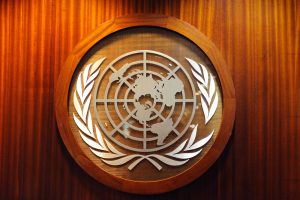Yesterday, Foreign Policy published an exclusive report claiming that the United States and China had brokered a deal that will prevent Myanmar’s military junta from claiming the country’s seat at the United Nations.
The question of who should hold Myanmar’s U.N. seat has loomed since February, when the country’s military overthrew the elected government led by Aung San Suu Kyi. The question was complicated by the fact that a few weeks after the coup, Kyaw Moe Tun, Myanmar’s Ambassador to the U.N., gave an emotional General Assembly address in which he publicly broke with the junta and pledged loyalty to the ousted civilian government.
The issue was expected to be taken up this week as the annual United Nations General Assembly (UNGA) opened in New York. But according to Foreign Policy’s report, China and the U.S. have come to an arrangement, the product of “weeks of behind-the-scenes diplomatic negotiations,” in which the UNGA’s Credentials Committee will defer its decision on Myanmar’s U.N. representation until the end of the General Assembly session in November.
As a result, Kyaw Moe Tun, who has since voiced his support for the opposition National Unity Government established in April, will continue to hold the seat – at least for now. In return, he will be expected to “hold his tongue” and refrain from lashing out at the junta during the UNGA session.
Since Kyaw Moe Tun pledged his loyalty to Aung San Suu Kyi’s government, Myanmar’s junta has tried unsuccessfully to fire him and replace him with the candidate of his choice. The junta, or agents acting in support of it, has also attempted to remove him by violent means. Last month, U.S. authorities announced that they had arrested two Myanmar citizens for allegedly plotting to “seriously injure or kill” the ambassador, whose security detail has since been bolstered.
The reported deal defers a potentially messy fight on the UNGA’s Credentials Committee, which has the routine, though occasionally controversial, task of determining which representatives can attend and speak on behalf of their countries. According to the Foreign Policy report, the nine-member committee has “informally endorsed” the deal, along with Russia, the European Union, and the Association of Southeast Asian Nations (ASEAN). The Committee is expected to sit in November.
What is the thinking behind the deal? According to the Foreign Policy report, the U.S. and its European partners “were concerned that a country sympathetic to the military regime’s claims” – read: China or Russia – “might appeal to the credential committees to take up the matter before its first scheduled meeting in November.” It quoted one unnamed diplomat as saying, “We’re interested in keeping the status quo as long as we can.”
In opting to put off a decision at least until November, the U.S. and China have opted for the pragmatic option of kicking the can down the road.
Given that any Chinese or Moscow push to seat the junta’s chosen candidate would likely involve a heated diplomatic fight with no guarantee of success, it is no surprise that Moscow and Beijing have opted to preserve the status quo. As the Indian journalist Angshuman Choudhury has argued, China has “clearly chosen to prioritize its bilateral interests with Washington D.C. over its ‘special relationship’ with the Myanmar military regime.”
Both the U.S. and China also have an interest in preventing Myanmar’s political crisis from becoming a subject of overt geopolitical competition.
The deal is likely to be received with ambivalence by those who have called on the U.N. to take a firm and unequivocal stance against the coup in Myanmar. On the one hand, Kyaw Moe Tun will continue to serve as the country’s legitimate representative to the world body – a win for the anti-junta opposition. On the other, he will be limited in how he can use his pulpit to voice opposition to the junta and its accumulating atrocities.
Like many diplomatic compromises, the outcome stops short of entirely satisfying either party. But sooner or later, the U.N. will be forced to consider the junta’s argument that it should be seen as the rightful holder of the country’s seat at the world body. The main questions now would seem to be whether the fast-moving developments inside the country will shift the diplomatic calculus of the major powers by the time the committee finally convenes to consider the question.
































